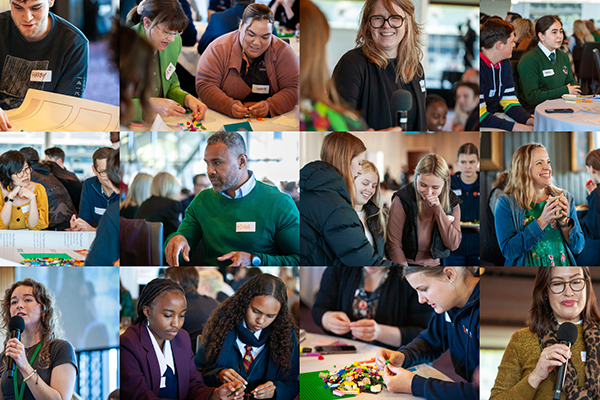The Roaring Twenties. A new decade. A new dawn. Little did we know the world would be roaring to a halt in less than three months. Shutdown. Streets, businesses, churches, restaurants, schools and more. Deserted around the globe.
Like many of you, we have joined conversations around the world with people who have a birds eye view of our current state due to their experience and role in institutions and governments from McKinsey & Co, to the United Nations, IBE UNESCO, OECD, WISE, World Health Organisation, the World Economic Forum to SingularityU and more.
While pandemics have been predicted, simulated, discussed and planned for by governments and organisations in many parts of the world, COVID-19 was still a surprise. The surprise then morphed into disbelief followed by the realisation of it’s impact - on individuals and on our collective way of working, learning and connecting with each other.
Like everyone, school education scrambled to respond. Like almost everyone, school education was unprepared. Unlike anyone, school education has 2.8 billion potential customers in every corner of the world. As of mid-April 191 countries had shut down schools affecting 1.6 billion students.
School education around the globe has overnight taken on a new form. A combination of remote and home-based schooling and student led learning from home, in class, on Zoom, on Facebook and FaceTime, in Google, YouTube, Tik Tok and more. Of course, students have been learning informally in these ways for many years. Now they have been formally disconnected from the classroom but without the broader system able to support them all equally. The disparity is clear not only between countries, but has become more visible within countries. Most recent reports in Australia state that between 30 - 40% of students have been disadvantaged by the current system or experienced barriers around learning either due to the digital divide or because a one-size-fits-all approach during a crisis isn’t a long-term solution.
Amidst this, teachers have been cast in the role of the ‘essential workforce’ becoming virtual facilitators, coaches, mentors, crisis counsellors and family support workers. The place where educator meets designer has been amplified and enlarged through rapid prototyping and iterating ways of curating and delivering existing and new content and knowledge. Many of the systems which oversee school education have been found wanting in this crisis, lacking in the processes, tools, adaptability and flexibility required to navigate the storm.
However, we didn't need the onset of COVID-19 to tell us that 40% of Australian students disengage regularly in the classroom, due to boredom and work being of an inappropriate level of challenge; that 25% of 15 year-olds believe that school has not prepared them for life after school, that 10% see school as a waste of time or that one in five students are failing to complete Year 12 nationwide.
Before COVID-19 it took young people on average 2.6 years to transition from full-time education to full-time work despite being more qualified than any previous generation. Pathways for young people are not enabling them to transition into real and meaningful work, or helping them gain access to jobs in the new economy. As we stare 20% youth unemployment in the face in 2020 and we are at risk of experiencing levels of unemployment nationwide not seen since the 1930’s, now is the time to re-think how learning pathways work. Can we invest in our young people and our economy by focusing on a new model of senior secondary education right now, and quickly?
The question we must urgently address is how we should define and recognise ‘success’ in senior secondary schooling, to make sure that every student can gain what they need to thrive. What we currently value is expressed in practice by what we assess, what we credential, and what we monitor in the national system. The measures of ‘success’ need to be re-crafted so that every young person can demonstrate what they know and can do to succeed on their own terms.
To this end, in 2020 Australia has launched a new alliance and collaboration - Learning Creates Australia, to lift our nation into a new era of learning. Learning Creates Australia is a first-of-its-kind national initiative, with a bold ambition – to create a more inclusive, productive and creative learning system. This is not a COVID-19 response, we have been working on this initiative for many years.
However COVID-19 does provide a significant disruption through which we might collectively envision a future where each and every young person, no matter their situation or circumstance, has a school experience which prepares them for lifelong learning, satisfying and productive work and a sustainable living.
Our launch project The learner’s journey, will contribute to this thinking and crafting. The work will explore how we might articulate, design, assess and accredit learning in a way which better reflects the diverse knowledge sets, skills and dispositions of students. There are many examples of these approaches in Australia already. Learning Creates aims to establish ways of recognising valued learning, that is trusted and understood by the community, has social and economic currency, and allows all 15-19 year olds to demonstrate their levels of confidence and creativity, knowledge and know-how.
This shift in how learning is recognised will enable there to be a more extensive range of pathways that are more informative for recruiters and selectors, and also importantly, more inclusive of the needs of students disadvantaged by the current dominant systems.
With core funding from The Paul Ramsay Foundation, The learner’s journey project is a collaborative effort. Learning Creates Australia is working with The Impact Assembly at PwC Australia, The Assessment Research Centre at the University of Melbourne and YLab through FYA to bring together the core team leading the work.
We look forward to collaborating with young people and many others across education, government, business and philanthropy, joining this alliance with an equally shared sense of possibility and urgency.
Soon we will see the restart of what may be the most decisive decade of our lifetimes. The focus on recovery and pull to revert to business as usual will be strong but the opportunity for reimagining is now. The insights and lessons for transformation which we all have gleaned from the thousands of Zoom conversations, webinars and articles throughout this crisis will serve us well as we respond to the rapid changes around us. Our message is – partner with those who share your purpose, because networks offer resilience. Advocate for the many, tackle the undeniable inequity; measure and report with transparency all that you do; communicate (communicate, communicate!) and share your knowledge and resources.
A new era in education awaits. We see a future created by Australians - adapting to change and learning through their whole life. Young. Old. Happy. Healthy. At home. On-Country. In study. At work.
We look forward to working with you to ensure Learning Creates Australia.
Jan Owen AM and Anthony Mackay AM
Co-Convenors, Learning Creates Australia
Jan Owen AM and Anthony Mackay AM are the Co-Chairs and Co-Convenors of Learning Creates Australia



